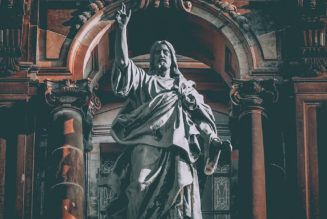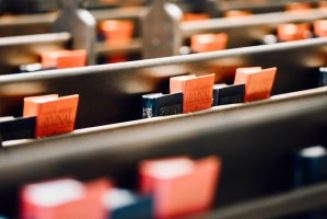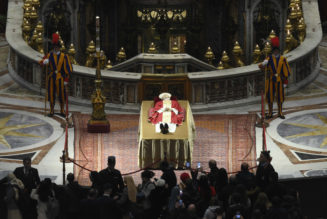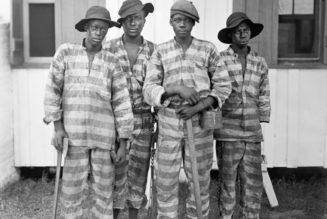By Dr. Jeff Mirus ( bio – articles – email ) | Apr 26, 2022
I opened my Bible today at random and found myself on the page which includes chapters 10 and 11 of St. Paul’s Letter to the Romans. In these chapters, Paul deals with one of the greatest mysteries of salvation history—the mystery that, through the disobedience of the Jews, salvation was mercifully offered to the godless Gentiles, such that while the natural Jewish branches of the tree of life were cut off, the Gentiles were grafted on in their place. But through their disobedience, the Jews put themselves in the same position, of having nothing to rely on but God’s mercy. Therefore, through the same mercy shown to the Gentiles, the Jews will be grafted back onto the tree.
As a sweeping outline of Divine Providence, St. Paul’s explanation here is about as deep and wonderful as we can possibly imagine. But at the same time, it is easy to misinterpret how all this is possible, and for whom. For this does not mean that all the Gentiles and all the Jews will, in the end, be saved. As far as we can tell, at least, such an interpretation conflicts with too many passages in Scripture, not only in the Old Testament but also including many words of Christ as recorded in the Gospels and explicated in the other books of the New Testament.
We have a similar interpretive difficulty with the famous passage in the eighth chapter of the same Letter, where Paul writes:
We know that in everything God works for good with those who love him, who are called according to his purpose. For those whom he foreknew he also predestined to be conformed to the image of his Son, in order that he might be the first-born among many brethren. And those whom he predestined he also called; and those whom he called he also justified; and those whom he justified he also glorified. [Rom 8:28-30]
Indeed, as St. Paul wrote to Timothy, God “desires all men to be saved and to come to the knowledge of the truth” (1 Tim 2:4), but even God’s fervent desire to embrace us in His eternal love does not mean that all will be saved. The most we can say is that we do not know how many will be saved, and that, in the vast majority of cases, which are untouched by an authoritative declaration by the Church, we cannot say for sure whether a particular person will be saved or not. On this we can cite St. Paul again, in his letter to the Philippians: “So now, not only as in my presence but much more in my absence, work out your own salvation with fear and trembling” (Phil 2:12).
If this were easy, there would be no need of fear and trembling. We might ask: Can anything eliminate this fear? St. John provides the answer: “Perfect love casts out fear” (1 Jn 4:18). But which of us could claim such a love without uniting our own love to God’s?
God gave us free will
So let us take a step back. The key to understanding all of this is that love cannot be forced. Even God cannot force us to love Him and still call it love. Therefore, the whole economy of salvation works for each of us only insofar as we cooperate with the graces we are given to know the truth and choose the good. And of course we cannot love what we do not know. When we open our minds and turn our wills to what we are given to know of God, this is true love, and it is just this that makes sense out of the verses cited above from Romans chapter 8, which begin: “We know that in everything God works for good with those who love him.”
Those “he foreknew” include everyone, all of whom (assuming their cooperation) are predestined to be conformed to Christ. Thus he calls all and even justifies all, and finally glorifies all those who cooperate with His grace, who do not reject His gifts. All of Divine Providence is ordered to this desire of God that all should be saved and come to the knowledge of the truth, but there can be no love of God without our cooperation. As it says in the Letter to the Hebrews:
But you have come to Mount Zion and to the city of the living God, the heavenly Jerusalem, and to innumerable angels in festal gathering, and to the assembly of the first-born who are enrolled in heaven, and to a judge who is God of all, and to the spirits of just men made perfect, and to Jesus, the mediator of a new covenant, and to the sprinkled blood that speaks more graciously than the blood of Abel. See that you do not refuse him who is speaking. For if they did not escape when they refused him who warned them on earth, much less shall we escape if we reject him who warns from heaven. [Heb 12:22-25]
In His mercy, God gives us many opportunities, and He also knows perfectly which opportunities we have received, and which we have not, and how we have responded, and how free we were in that response. But in the end, we must “love, because he first loved us” (1 Jn 4:19).
It is because love is always a free act of the will that, as my title suggests, salvation comes through perseverance in love—at least for all of us who have the opportunity to persevere. This is why St. Paul describes the essence of salvation history as consisting in God’s unrelenting effort to make us recognize our need for mercy. We are not holy in and of ourselves. Rather, we become holy through a recognition of our utter dependence on the mercy of God, and our willingness to return a love that we have not merited.
Once again, this is possible because, through an incomparable grace, we can unite our own will to the will of God. To grasp this we must revisit Paul’s first letter to the Corinthians. We must reread chapter 13, in which he reminds us that nothing matters but our love—neither tongues nor prophecy, nor knowledge, nor even sacrifice. It is precisely through love that we must believe, hope and endure all things, and there will always be much to believe, to hope, and to endure.
Even through all our imperfections, which we will recognize even more clearly as we progress, we must be steadfast. There are, of course, many individual goods. But all of them are rooted in God, and so we have only one job: To persevere in the love of God—to welcome God in every “now”, forever.
Sound Off! CatholicCulture.org supporters weigh in.
All comments are moderated. To lighten our editing burden, only current donors are allowed to Sound Off. If you are a current donor, log in to see the comment form; otherwise please support our work, and Sound Off!

Join Our Telegram Group : Salvation & Prosperity









